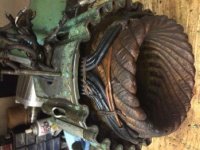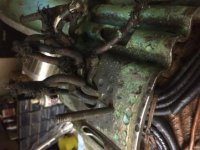I have an old woods 3 phase motor that I’d like to restore. It is for a direct drive jointer and I’d rather not change the motor since the motor is made for the machine and don’t want to convert it in any ways if I can help it. Getting into the motor it’s obvious the leads are old and crunchy and unsafe. I’d like tease out all the leads and add longer new condition leads. I’m not opposed to take it to a motor shop but I’d like to do it myself if it’s reasonable. From other forums I’ve learned to ask
1. What kind of wire
2. How to connect the wire
3. How to insulate.
Thanks. Philip
1. What kind of wire
2. How to connect the wire
3. How to insulate.
Thanks. Philip



